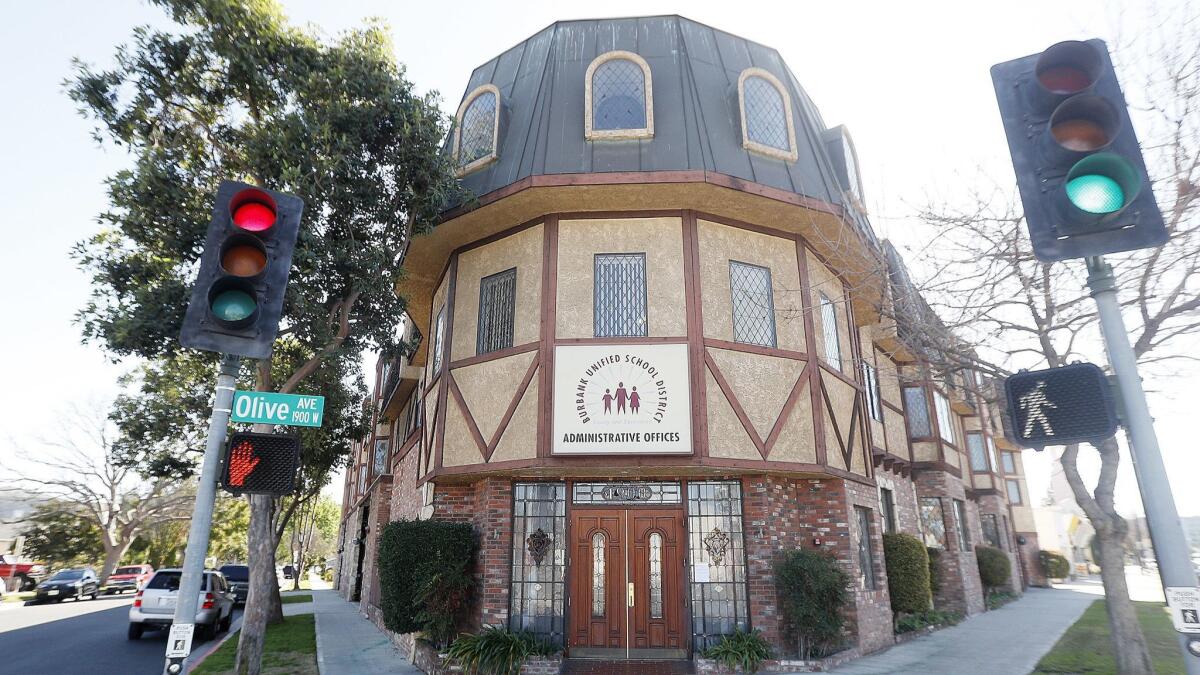Burbank Unified talks about potential budget cuts at town hall

Students, teachers, school employees, board members — and mostly parents — gathered Monday evening for the first of two meetings about Burbank Unified’s budget, Measure I and possible cost-cutting scenarios if the measure doesn’t pass on March 3.
Debbie Kukta, Burbank Unified’s assistant superintendent of administrative services, gave a PowerPoint presentation about the budget for the 2019-20 school year. The General Fund revenues total about $168 million, with 83% going toward teachers and school employee salaries and benefits, 6% for books and supplies and 11% for services and operation, while there is no funding allocated for improving facilities.
Kukta and Burbank Unified Supt. Matt Hill discussed multiple points of financial pressure, such as pensions and Gov. Gavin Newsom lowering the cost of living in the budget, as well as a history of how schools receive funding from the state.
Schools in communities that have higher needs get more resources, and Hill described the system of funding as good because it should end generational poverty in the state, but he noted that Burbank is a middle-class-to-affluent community.
Boston has a similar cost of living as Burbank. However, whereas Boston school districts receive $20,000 per student a year, Burbank gets $10,000 per student, Hill said.
“It’s not just a Burbank problem, it’s a statewide issue,” Kukta said.
Surrounding cities like La Cañada have passed a parcel tax, and Glendale probably isn’t far behind, according to Kukta.
About $3.2 million in cuts are proposed for the next school year if Measure I doesn’t pass on the March 3 ballot. The measure is a parcel tax with a 10-cents-per-square-foot annual fee for property owners to generate $9.1 million annually for the district for 12 years.
Hill listed all the possible cuts in jobs, classes and resources and fielded questions from the attendees.
Proposed budget cuts would include eliminating five elementary physical education teachers, who teach at 11 schools. Three elementary music teachers would be eliminated in the first year and another two teachers would be cut the following year.
Last year, there was a round of job cuts in the district, including director of secondary education. This year, another three to five jobs would be eliminated in the district office.
The district would continue not filling job vacancies, such as principals, and no longer fund facility maintenance, such as plumbing and air conditioning.
Although Burbank Unified officials won’t take services directly tied to individual education, they will “streamline the services” for special education, according to Hill.
Stage-tech animation, medical pathways and other career-skills electives in middle and high schools would be phased out over the next three years. Summer school offerings would be cut. Class sizes would increase from an average of 30 students to about 37 students.
“These cuts are not unique. Surrounding districts that have not passed the parcel tax have been making these similar cuts. The question on March 3 for the community is ‘Is it an investment in public education of about $14 a month to keeping these types of programs?’” Hill said.
He added, if the answer is “yes,” the budget cuts will be undone. If the answer is “no,” these are the types of cuts the district will make.
The main argument opposing the measure is about how the tax would be a burden on residents.
“Asking the community for more taxes, taking money off their dining room table and investing in schools — that is a burden. And we have to take that seriously,” Hill said.
If the measure passes, the money would be distributed in four ways: retaining and recruiting employees (a combination of compensation and health benefits), maintaining small class sizes, career readiness (STEM and supporting arts) and safety and wellness.
“The district has local control over that. We can choose how to spend it,” Kukta said.
An independent oversight committee made up of community members would have public meetings to make sure money is spent where it should be allocated, Hill said.
For those who couldn’t make it to the first meeting, the district plans to hold another budget town hall on Feb. 13 at 7 p.m. in the cafeteria at Jordan Middle School, 420 South Mariposa St.
